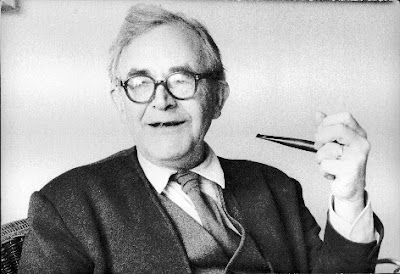Lots of history today and the reading, I'm not sure I quite kept up. Although, I like Dahm's writing (or perhaps it's a translation and I like the translator?) It was all very easy to follow, and I like that. Especially when reading history. It was a helpful "big picture." So this whole German Church thing starts to get pretty complicated, right? Dahm does a great job, but I had a hard time keeping up with this socialist party versus this other one and the Christian-Germans and the German-Christians, it makes a person dizzy really. But Dahm says (as does the short article from the Lutheran Church) that the state of Germany was confusing, and that it was, even in hindsight.
So what I find interesting is that Germany was a romantic. They seemed to romanticize everything to the point where it all seemed fantastical. It would be very easy for anyone to maneuver their way into power (Hitler) when the entire state of a country is daydreaming about better days in the past and future and not paying much mind to current state of affairs except to recognize they were miserable. On top of things they were dealing with disillusionment.
It's a tragic story really. Reading Harnack yesterday, I didn't have much pity for Germany's problems with Great Britain and well I suppose most of Europe preceding and during the first World War. I'm not sure why, I just didn't really find Harnack's points in his rebuttal to the Brits all that convincing. Stepping back however and looking at Germany's history from the time immediately preceding the second reich,leading up to 1939, it's all very sad. Germany, (who seemed to me like a Jim Jones figure almost, brainwashing its countrymen into a false sense of pride...maybe it's presumptuous of me to say false sense) set itself up to be almost seemingly utopic. I wouldn't be surprised if postcards circulated with a "welcome to Germany" sign pictured on the front and in bold italics, "Europe's Pride." But that's an aside. So Germany has all this pride, she believes she's divinely chosen, she convinces her people they're divinely chosen (excuse me, we're talking about the Fatherland...so he). It's their duty to spread the Gospel, bring in the Kingdom of God, let other nations how great he is! Then the war comes, and all is lost. They lose their pride and their sense of unity and no one really knows what to do. So they set up the Republic, the republic fails, more and more problems until we find ourselves in the time of Hitler. But I feel for Germany in a way...more so for its people. I just feel like even 70 years later, reading this, I find it difficult to understand why everything happened the way it happened. It seems like it didn't have to happen that way. All those genius intellectuals.
Then the whole issue with the Church. I have to agree wit Dahm. Protestantism failed the people of Germany. I'm not really sure whose fault it is, if it's the fault of anyone at all.
On to Barth.

Interesting article. I'm supposed to lead the discussion.
I have a few questions regarding "The Problem of Ethics Today."
The first question being, what is the question of the problem of ethics?
The most I can gather is from page 148. Barth says, "For us the urgent ethical questions are reduced to one: how we may be impartial to the truth of the Creator."
Ultimately what he gets at is that the question of ethics is never solved. The problem of ethics is when one stops asking the question.
Barth says that the problem of ethics is solved by Paul and the Reformation by forgiveness. Barth ultimately says the solution is Jesus Christ.
It's all rather abstract if you ask me. But I'm assuming it has some place in the grand scheme of this history or we wouldn't be reading it. During this time Germany is on the brink of economic crises. And the church's response to the political and economic crises was to merge Church and Government again as it was before the first world war and perhaps you have a rise of the German Church? Which the Lutheran and others were against. This is the backdrop to what Barth is writing. Barth keeps begging the question what ought we do, what ought we do regarding ethics...perhaps he means it as well in Germany in general since that seemed to be the question many people were asking! There were also those waiting for a Messiah figure. Romanticizing a future German Government but otherwise not doing anything... so maybe that's why he says about when we stopping asking the question of ethics that leads to our death?
Also, what does this say about Germany. What is Barth saying about Germany? I'm going to leave myself with that question because I'm tired.





